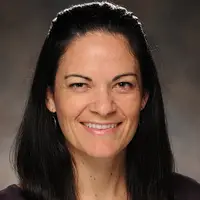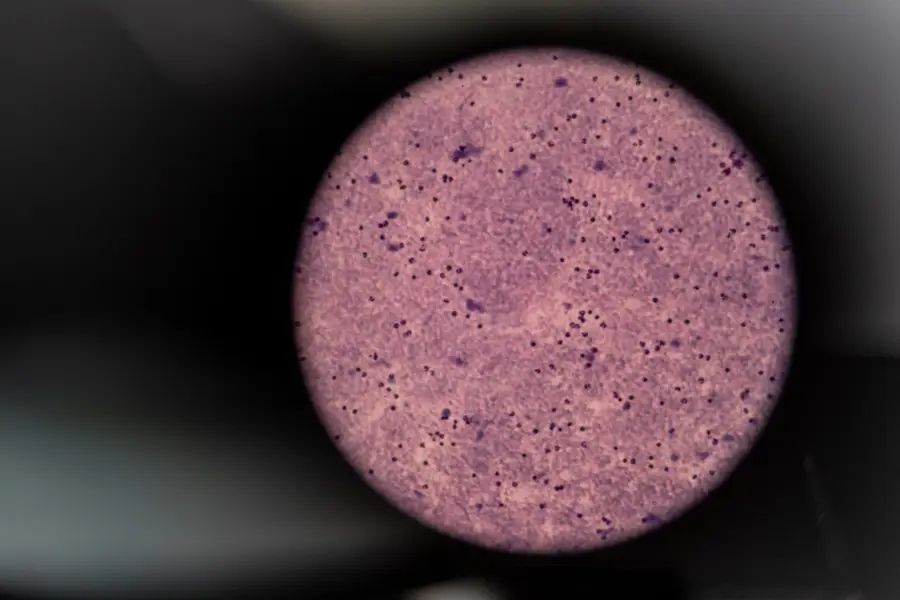
Lab technicians in Indonesia analyze night blood survey samples like this one, as seen in a microscope, to determine if lymphatic filariasis worms are present. Photo Credit: RTI International/Oscar Siagian
Encountering crocodiles while traveling by boat. Hiking through thick jungle for hours. Driving on a narrow, bumpy road with a sheer cliff on one side.
It’s all part of the job of being a lab technician in Indonesia for Arief Rakhman. Arief works for a regional health laboratory in Jakarta, Indonesia, a country that consists of 17,000 islands.
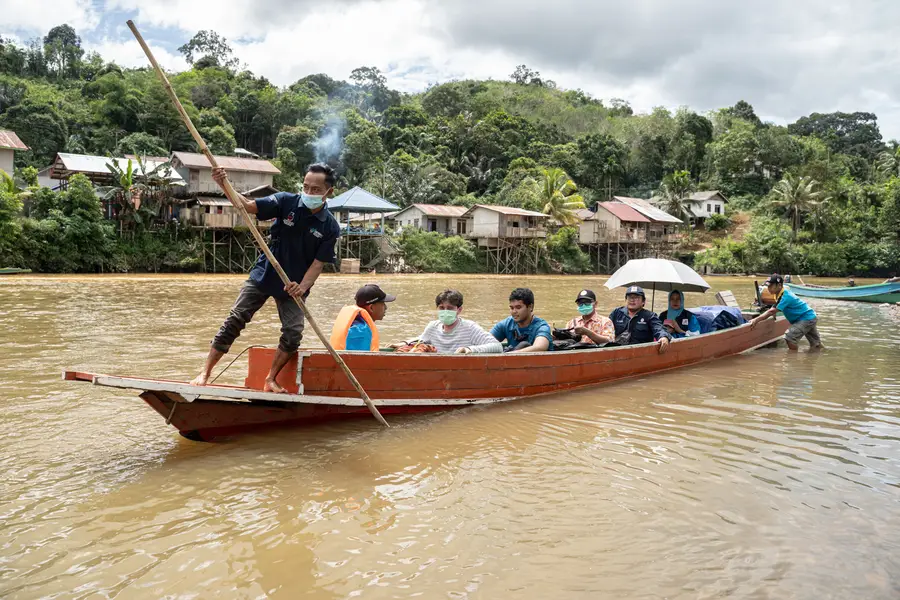
A team from the Indonesian Ministry of Health travels by boat to reach some of the most remote villages in Indonesia to take blood samples after nightfall. Photo Credit: RTI International/Oscar Siagian
When Indonesia’s Ministry of Health does a survey of lymphatic filariasis (LF), he often joins other health workers to supervise the night blood surveys used to detect this neglected tropical disease (NTD). These assignments take him to some of the most remote places in Indonesia, requiring travel by boat, motorcycle, car, and foot in the middle of the night.
“I get to experience new things, which is different from my routine at the lab,” Arief said.
USAID has helped Indonesia support lab technicians like Arief, who are critical to the country’s effort to eliminate NTDs like LF.
Building a network of labs and technicians
Night blood surveys are a valuable tool in this effort. They help the Ministry of Health accurately determine active cases of LF and thus transmission risk. Spread by mosquitoes, this NTD starts as small worms in the blood, which travel to the lymph system where they mature and multiply, eventually causing disfigurement in their human hosts. The worms are most active at night, so blood samples taken at night are the best way to find active infections.
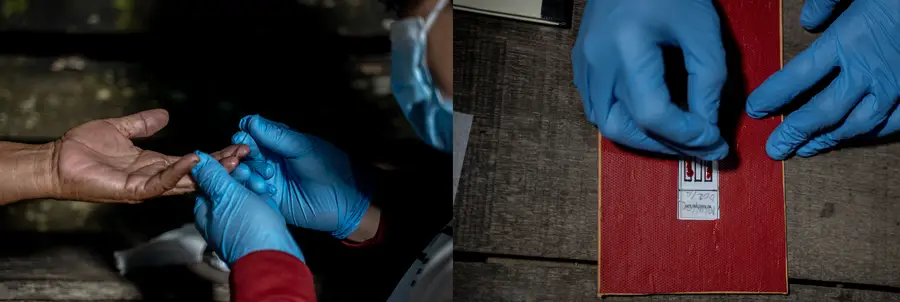
Health workers collect blood samples from people in remote villages in Indonesia at night. With the help of trained lab technicians like Arief, they smear the blood sample in three lines on a microscope slide. A paper stencil is placed under the slide to ensure correct positioning and quantity. Photo Credit: RTI International/Oscar Siagian
Accuracy is paramount when preparing night blood survey slides, as enough blood, spread in three straight lines, is needed for a readable sample. Technicians must air dry and stain the slides, often while working in extremely remote areas. Back at the lab, reading the slides can be challenging as the small LF worms are hard to spot.
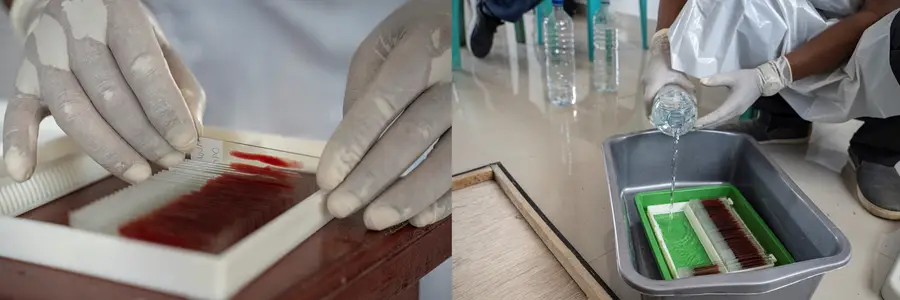
A lab technician prepares blood sample slides for processing and analysis. Slides are air dried for 24 hours and then soaked in water with a neutral pH for 20 to 30 minutes. Photo Credit: RTI International/Oscar Siagian
“The whole process is important to get a good sample,” Arief said. “From blood withdrawal to make a slide, transporting samples with care, processing samples properly with giemsa stain, and microscopic examination.” Any mistake along the way can interfere with microscopic testing.
Getting people to participate late at night is no easy task either. Communication beforehand, often through village elders or local health centers, helps to prepare community members for a night blood survey and educates them on the survey’s importance to LF elimination.

A lab technician uses chemical solutions to fix cells to the slides and stain them prior to microscopic inspection. Photo Credit: RTI International/Oscar Siagian
Once survey teams get a blood sample, it’s vital that they move quickly to make the most of it. Blood samples must be air dried within 24 hours and processed immediately after that. As someone who reads the samples back at the lab, Arief’s participation helps to ensure the samples collected are accurate and usable.
“I work at night, I process the samples in the morning, then I rest at noon and afternoon,” Arief said of his night blood survey schedule.
USAID has helped strengthen the capacity of labs and their technicians, like Arief, to accurately collect, process, and read samples – and perform quality control on them. It’s all part of USAID’s partnership with Indonesia to establish sustainable systems and capacity to monitor and eliminate disease.
“The Ministry of Health greatly appreciates the strong support we have received from USAID over the years to help strengthen the capacity of our staff and expand program implementation. With strong partners like USAID we are confident we will be able to reach our goal of elimination of LF by 2030”, said Dr. Regina Tiolina Sidjabat, Head of the NTD Work Team at Indonesia’s Ministry of Health.

Arief views processed slides from a night blood survey to identify LF worms in the samples. Close and detailed inspection is needed as the LF worms are hard to spot and can easily be confused with other worms in the blood. Photo Credits: RTI International/Oscar Siagian, Right: Slide shows positive infection from a blood sample collected in Melawi, Indonesia. Photo courtesy of Arief Rakhman.
Today, annual trainings at the University of Indonesia provide lab technicians with the most current information on LF testing, including an opportunity to practice preparing and reading microscope slides.
Skilled, knowledgeable, and experienced technicians like Arief make long-term monitoring of diseases like LF possible. That’s why USAID has supported capacity building activities for the regional labs involved in NTD elimination efforts. Once LF is eliminated, these labs and technicians will be critical for monitoring for any reemergence.
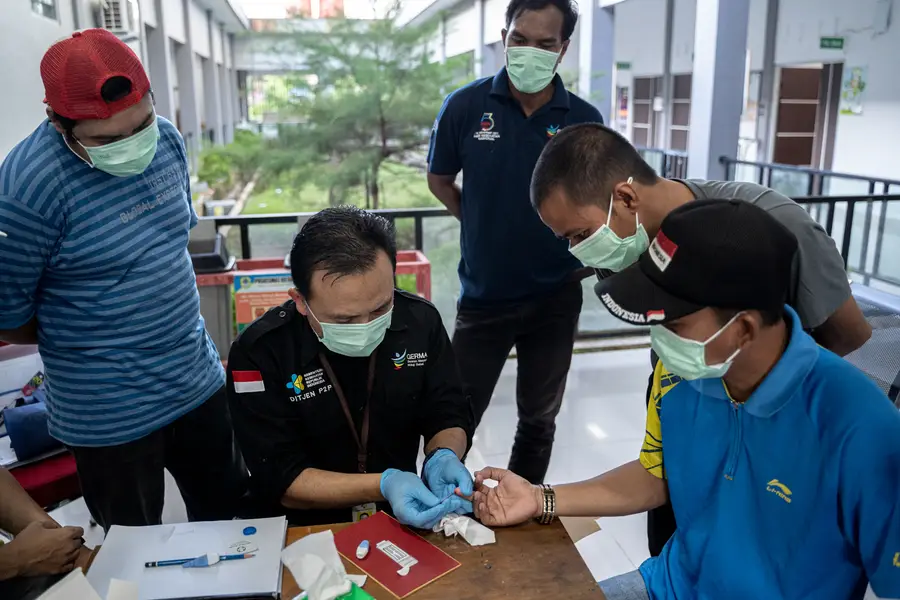
Representatives from the Indonesian Ministry of Health train health workers and lab technicians on blood sample collection ahead of a night blood survey. Photo Credit: Oscar Siagian / RTI International
As countries around the world move closer to elimination of LF, new survey methodologies are being developed that require both rapid tests and confirmation of positive results with night blood surveys, which is bringing the method back into the mainstream.
Indonesia’s leadership on night blood surveys can be an example to other countries. Arief sees the potential of his country to lead the way.
“Globally I want Indonesia to be a role model for the activities in the field, for how we do health promotion in remote areas,” he said.
About Act to End NTDs | East
USAID’s Act to End NTDs | East is a global flagship program led by RTI working to eliminate neglected tropical diseases in 12 countries in Africa, Asia, and Latin America. With USAID support, Act to End NTDs | East works with health ministries to treat communities, measure progress, and strengthen health systems to deliver NTD services.
Learn more about RTI’s efforts in the elimination of neglected tropical diseases.

Act to End Neglected Tropical Diseases | East
Controlling and eliminating neglected tropical diseases around the world
